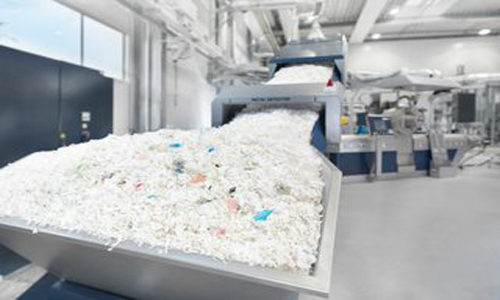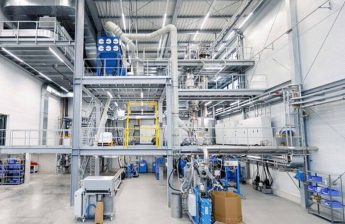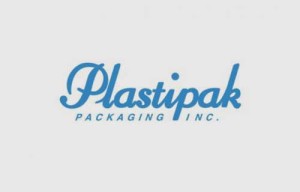 Plastics recyclers face a multitude of tough challenges. Getting access to a sufficient supply of potential recyclable plastic is one of the
Plastics recyclers face a multitude of tough challenges. Getting access to a sufficient supply of potential recyclable plastic is one of the
biggest, and even when they find material it often is so contaminated that it cannot be economically recycled. There is plenty of work ongoing to help recyclers tackle this challenge, fortunately, to include work we’ve reported on for recycling of heavily printed films.
More recently, two plastics recyclers in North America, ABC Polymers and KW Plastics, have had success recycling even highly contaminated plastic scrap without substantial losses in economy and productivity. In this case, both companies credit their investment in a Fimic continuous self-cleaning screen changer, supplied by ADG Solutions (Fairfield, CT).
Extrusion industry veteran Sandy Guthrie founded ADG Solutions last year. Depending on the equipment system, ADG Solutions serves as a distributor, importer, or manufacturer. Guthrie started in plastics in 1978 with a sales position at Sterling Extruder, which had been founded by his father. Until December 2010 he was a business director at the Merritt Extruder business unit of Davis-Standard
Davis-Standard has appointed ADG Solutions as the exclusive North American distributor for its reclaim and compounding equipment, and Fimic Officine Meccaniche asked ADG Solutions to be the exclusive North American importer of its self-cleaning screen changers for reprocessing of plastics scrap. ADG also markets washing equipment from Italy’s Tecnofer, and offers a range of size reduction systems for polystyrene foam, with those machines designed by Sandy Guthrie and manufactured by ADG Solutions.
ABC Polymers Inc. (Stone Mountain, GA) and KW Plastics (Troy, AL) both have been able to reduce downtime by 30% following installation of the Fimic screen changers on their recycling lines. According to ADG, both customers now can run new types of raw material that previously could not be processed because of their high level of contaminants, particularly paper and paperboard, which required constant operator intervention.
Mounted at the end of a reprocessing extruder, a screen changer filters out contaminants from molten plastic before it is pelletized. “Standard slide-plate screen changers are ineffective with high contaminant levels because of the labor involved in continuously changing screens,” explains Guthrie. “Also ineffective, especially with paper and cardboard contaminants, are backflush-type filters, because the contaminant blinds the screen and causes the system to be in a perpetual backflush mode, with huge volumes of material wasted in the purge.”
For both ABC Polymers and KW Plastics, ADG Solutions also supplied Davis Standard’s Ram Stuffer reclaim extrusion systems and helped with design of the installations.
Problems solved
ABC Polymers recycles more than 250-million pounds annually, with customers throughout the Americas and in Asia. In a reprocessing line with the Fimic plastics recycling equipment system installed, ABC runs chiefly low- and linear low-density polyethylene (PE), though it has also used the line to recycle polypropylene (PP) and polystyrene (PS). Typically the source material is stretch wrap, bubble wrap, and foam used for packing and shipping. Contaminants, up to 3%, may consist of labels, paperboard, and plastics such as nylon cords or PET strands, whose higher melt temperatures result in filter-clogging “unmelts.”
“Previously it was not economical to run this type of material, given the need to wash and dry it before processing, clean away buildup from a conventional screen changer every few minutes, and lose a significant amount of good material with every purging,” said Jeramy Daniels, president of ABC Polymers. “The Fimic system has reduced our total cost for using the material by 25 to 30%.”
Meanwhile, KW Plastics installed the Fimic plastic recycling equipment system on four reprocessing lines, primarily to handle PP scrap, including rigid parts, woven and nonwoven fabrics, fibers, and film. Typical contaminants are labels, paper, cardboard, and non-PP unmelts, such as nylon and PET. The company sells its recyclate-based compounds for injection molding applications including automotive components, batteries, containers, and industrial caster wheels.
“We wash all materials before processing them, but some materials are virtually impossible to get clean enough for conventional screen changers,” said KW company co-owner Kenneth Campbell. “The Fimic system has opened the door to new source materials for us. The beauty part of the system is that it has a huge 24-in.diameter screen and its operation is completely automatic.”
According to ADG’s Guthrie, the Fimic screen changer can handle scrap with up to 3% loadings of contaminants without a slowdown or stoppage of the process, and even contaminants close to an inch in diameter do not pose a problem. “The self-cleaning action is very efficient, with purgings averaging less than 2.5 lb. per cleaning cycle and minimal discharge of good material along with contaminants.”
The self-cleaning cycles are subject to automatic PLC control. In each cycle, as molten polymer enters the screen changer, contaminant accumulates on the screen plate, which is a stainless steel component. The buildup continues until backpressure reaches a preset level. This actuates a rotating blade which sweeps the screen and purges the contaminant through a central discharge port. Typically the screen does not need to be touched or changed more often than every week or two, depending on the material being processed.
Source : plasticstoday.com








